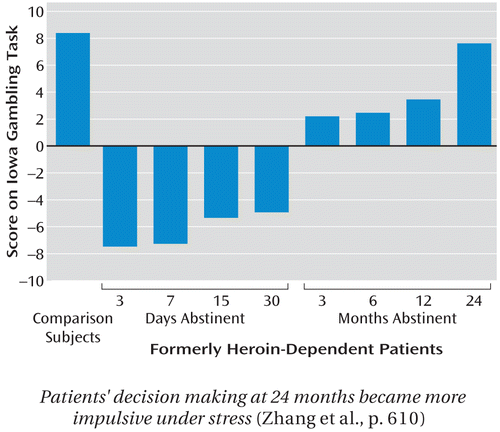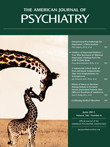In This Issue
Stress Alters Decision Making After Abstinence From Heroin
Patients with heroin dependence who have been abstinent for up to 30 days commonly show impulsivity both clinically and in laboratory testing, but those abstinent for 3–24 months perform as well as healthy comparison subjects. Zhang et al. (p. Original article: 610) discovered, however, that a stress-provoking test uncovered impulsive decision making in the long-term abstinence group, while the comparison subjects were unaffected. This stress-related effect was blocked by the beta-blocker propranolol in patients who had abstained from drugs for 30 days, 12 months, or 24 months. The editorial by Kosten (p. Original article: 566) highlights the value of linking clinical observations of substance use disorder to underlying neurobiology.

Patients' decision making at 24 months became more impulsive under stress (Zhang et al., p. 610)
Clinical Guidance: Effect of Treatment of Maternal Depression on Children's Behavior
Children whose mothers are depressed have increased prevalence of psychiatric symptoms and behavioral dysfunction. However, children ages 7–17 years whose mothers' depression remitted in the course of the STAR*D studies showed substantial decrease in externalizing symptoms and improved psychosocial function, as reported by Wickramaratne et al. (p. Original article: 593). Birmaher in an editorial (p. Original article: 563) points out that clinicians treating women need to be alert to the possibility of illness in their children and that standard treatments of the children, such as cognitive-behavioral therapy for depression, may not be successful until the mother's depression has remitted.
Clinical Guidance: Persistent Postpartum Psychosis Because of Unrecognized Urea Cycle Disorder
Fassier et al. (CME, p. Original article: 576) describe a woman with apparently persistent postpartum psychosis that was caused by an initially unrecognized genetic deficit in the urea cycle. The biological stress of pregnancy may have brought this indolent condition to symptomatic significance.
Clinical Guidance: Effectiveness of Interpersonal Psychotherapy of Depression
Cuijpers et al. (CME, p. Original article: 581) analyzed 38 studies of interpersonal therapy in depression. Interpersonal therapy was more effective than control conditions, with the number of patients needed to treat to show effect less than 3. It was not more effective than other psychotherapies and was less effective than pharmacotherapy. However, combined interpersonal therapy and psychopharmacology were more effective in preventing relapse than psychopharmacology alone, with the number of patients needed to treat less than 8. Interpersonal therapy thus has validated effectiveness for treatment and prevention of relapses of depression.
ADHD and Poor Emotional Self-Regulation
Excess emotional reactivity in people with attention deficit hyperactivity disorder (ADHD) may signal a distinct familial ADHD subtype. Surman et al. (p. Original article: 617) compared adult siblings of subjects with both ADHD and deficient emotional self-regulation, relatives of subjects with ADHD only, and relatives of healthy subjects. High rates of ADHD were present in the adult siblings of both ADHD groups, but deficient self-regulation was frequent only in the relatives of subjects with both disorders: 27% compared with 5% for relatives of subjects with ADHD only and 0% for comparison relatives. The rates of bipolar and other psychiatric disorders did not differ between the relatives in the two ADHD groups.
Clinical Guidance: Effective Treatment of the First Episode of Schizophrenia
Fewer than 50% of patients in the Finnish health care system continue treatment for the first 2 months after an initial hospitalization for schizophrenia, according to Tiihonen et al. (p. Original article: 603). Choice of treatment affects relapse rate. Injectable long-acting antipsychotics have a 64% lower relapse rate than equivalent oral medication. Clozapine and olanzapine have significantly lower relapse rates, compared to risperidone. Antipsychotic use overall is associated with decreased mortality.



